Austrian People's Party
The Austrian People's Party (ÖVP, Volkspartei), since 2017 also The New People's Party, is one of Austria's traditional major parties. It represents the bourgeois, conservative spectrum and is traditionally considered close to the economy, farmers and the Roman Catholic Church.
The ÖVP is divided territorially with its nine regional organisations and functionally with its six sub-organisations (Junge ÖVP, Österreichischer Arbeitnehmerinnen- und Arbeitnehmerbund (ÖAAB), Österreichischer Bauernbund, Österreichischer Seniorenbund, Österreichischer Wirtschaftsbund and ÖVP Frauen), resulting in different interest groups with partly contradictory claims within the party. Due to the indirect party membership, membership is mainly acquired in one of the sub-organisations and only rather exceptionally by joining the ÖVP directly. Thus most ÖVP members pay, with clear differences in the amount of contributions, to their respective sub-organisation and not directly to the party. According to the statute, the contributions are divided between the party and the sub-organisation.
The ÖVP has provided the Federal Chancellor in 15 of 32 federal governments since 1945. Six of Austria's nine state governors (in Lower Austria, Upper Austria, Salzburg, Tyrol, Vorarlberg and Styria) are members of the ÖVP; it is also part of the state government of Carinthia. Since the federal government of Vranitzky II (1987), the ÖVP was represented in the federal government without interruption until the removal of the federal government of Kurz I in 2019. In the current Federal Government Kurz II, the ÖVP provides, in addition to the Chancellor, the Minister of Foreign Affairs, the Minister of Finance, the Minister of the Interior, the Minister of Education, the Minister of Labour, as well as the five Ministers for Digitalization and Economy, for National Defence, for Agriculture and Tourism, for Integration, Women, Youth and Family, and also for European Policy, in addition to a State Secretary in the Ministry of the Environment. With Franz Fischler, Benita Ferrero-Waldner and Johannes Hahn, the People's Party provided all Austrian Commissioners in the European Union. With Kurt Waldheim and Thomas Klestil, two of its candidates were elected Federal President and held office for a total of 18 years.
Principles
Already at its foundation in 1945 the ÖVP saw itself - also from the lessons of the First Republic, which had led to Austrofascism and National Socialism - as a broad bourgeois people's party, which was to unite Catholic social teachings, conservatism and liberalism. It differed from its predecessor, the Christian Social Party (CS), in its commitment to parliamentary democracy and the Austrian nation. Its commitment to the nation was directly linked to that of the Austrian Action of the interwar period.
The close relationship to the Catholic Church initially continued through personnel and in the social structure, but the Protestant-oriented Landbund (LB), for example, was also absorbed into this party, which in the First Republic had still belonged to the German nationalist camp. Overall, the focus was on a middle-class, centrist party, which was also reflected in the choice of name. Although the religious reference no longer appears in the name in the Second Republic, in order to take account of the consistent separation of church and state, the ÖVP is to this day associated with Christian Democratic values, and as such, since Austria's accession to the EU, also part of the Group of the European People's Party (Christian Democrats) in the European Parliament.
The basic programme of 1945 (15 guiding principles) was followed in 1972 by the Salzburg Programme, which was supplemented in 1985 by the Future Manifesto.
In its 1995 manifesto, the "Christian Democratic Party" and "Party of the Ecosocial Market Economy" tried to take account of social and political developments: "Party of the liberal constitutional state and the open society". In it, the "Austrian Party in Europe" advocated, among other things, the following values: "freedom, responsibility, performance, security and subsidiarity", as well as "preserving the natural foundations of life for future generations".
In 2015, the party adopted a new manifesto and organisational statute and refers to itself as the "New People's Party". In this, the ÖVP sees itself anchored in the political centre: "We are the party of the political and social centre". The People's Party still sees itself as committed to the Christian-humanist image of man, but now places the various religions "as sources of values" almost on an equal footing; it also faces up to the possibilities "of biotechnology at the beginning of human life" and does not want to dictate to people "how they have to live".
In addition, the party is seen in principle as being close to the economy. However, the economic figure of the honourable merchant is elevated to the role model not only in the economy, but "in all areas of society". A middle course of conservatism and economic liberalism is propagated, with more personal provision and less "state-guaranteed solidarity". The traditional representation of the rural peasantry - as distinct from the urban working class by the left - lost importance over time.
History
Foundation and beginnings
The ÖVP was founded on 17 April 1945 in the Schottenstift (Schottenhof, 1st district) in Vienna by Leopold Kunschak (chairman), Hans Pernter (managing chairman), Lois Weinberger, Leopold Figl, Julius Raab and Felix Hurdes (general secretary).
A broad spectrum of positions was to have a place in the collective movement "Austrian People's Party". In essence, it was a matter of balancing between the Heimwehr-oriented "Fatherlanders", who at the beginning of the 1930s, still on the basis of the Heimwehren's "Korneuburg Oath", had pursued the dismantling of parliamentarism in Austria, and those Christian Socialists who now, after the period of National Socialism, professed parliamentary democracy and had renounced the authoritarian course under Engelbert Dollfuß. In terms of economic policy, the ÖVP, in accordance with Catholic social teaching, initially took a stance critical of capitalism (comparable to the Ahlen Programme of the German CDU) and only from 1949 onwards clearly declared its support for free-market concepts.
As a foundation for the new party, an alliance structure was established. Even before the ÖVP, the Arbeiter- und Angestelltenbund and Bauernbund (also apostrophized as the "cradle of the ÖVP") were founded in April 1945, and the Wirtschaftsbund in early May.
Five days before the founding of the ÖVP, the Red Army had marched into Vienna. Karl Renner, who had already been prominently involved in the founding of the First Republic in 1918, began talks with all three parties, the newly founded ÖVP, the SPÖ, of which he was a member, and the KPÖ, on forming a government, with Stalin's approval.
The government, which he headed as Chancellor of State, eventually comprised 29 members (secretaries of state with the rank of today's ministers, undersecretaries of state with the rank of today's secretaries of state). The three founding parties of the Second Republic were equally represented in it and controlled each other because there was no parliament yet. The ÖVP had nine members, in the government first party leader Kunschak, soon Figl (as State Secretary without portfolio). In this government the ÖVP had secured the economic portfolios: Trade and Transport, Agriculture and, from 26 September, the Foreign Office.
In mid-June the Federal ÖVP formulated its "15 programmatic principles", and in September it completed the change of generations at its head: Figl became Federal Party Chairman, Kunschak Honorary Chairman.
On 20 October 1945 the Renner government was also recognised by the Western Allies, and shortly afterwards it called elections to the National Council. In the election campaign the ÖVP positioned itself as "the Austrian party" with the state colours, in the pioneering and reconstruction spirit, decidedly anti-Marxist. With 49.8 % of the valid votes and 85 mandates, the ÖVP won an absolute majority. On the basis of this election result Leopold Figl once again formed a concentration government (instead of a possible sole government), which in addition to seven ÖVP members included five SPÖ members (Vice-Chancellor: Adolf Schärf), but only one KPÖ member.
In the National Council elections on 9 October 1949, both the ÖVP and the SPÖ lost significant shares of the vote: the ÖVP around five percent, the SPÖ around six percent. On the other hand, the newly founded Verband der Unabhängigen (VdU), the rallying point of the "national, third camp", with 11.6% of the vote, managed to enter the National Council at the first attempt (in Austria, the term "national camp" always refers to the German Nationalists). Leopold Figl then formed his second coalition government with the SPÖ under Adolf Schärf.
The "Raab-Kamitz-Course"
After the defeat of the ÖVP candidate Heinrich Gleißner in the first popular election of the Federal President in May 1951, there was open internal criticism of the party leadership in the ÖVP and finally the successive takeover of the party leadership by the economic wing around Julius Raab. In June 1952 Raab was elected executive chairman of the party and at the end of February 1953 party chairman. Subsequently there were further personnel changes in the government and a strengthening of the "Fatherland" in the ÖVP at the expense of the Christian Social direction.
The economic programme of Finance Minister Reinhard Kamitz was geared to austerity and a hard schilling currency. The SPÖ refused to give its consent. This led to early elections on 22 February 1953, in which the ÖVP again lost significantly and fell behind the SPÖ in terms of votes. Due to the electoral law, however, it had a lead of one mandate over the SPÖ. Federal President Körner entrusted Raab with the formation of the government, and on 2 April 1953 the ÖVP-SPÖ Raab-Schärf government took office.
The implementation of the economic concerns of the ÖVP happened in the construction of the social market economy under Kamitz with the attempt of a simultaneous reorganization of the state budget by thrift and investment promotion of consumer goods production (according to the propagated motto: "First earn, then spend": the "Raab-Kamitz course"). Decades later the ÖVP criticized the debt policy of Bruno Kreisky and the SPÖ respectively, referring to the thrifty Kamitz, who had propagated a largely balanced state budget.
In 1955 the Raab-Schärf government conducted negotiations in Moscow, during which, according to legend, the hard-drinking Austrians Raab and Figl "drank the Soviet delegation under the table" ("Now d' Reblaus, dann san s' waach!" a German newspaper quoted in a cartoon). The government promised the Soviet Union Swiss-style neutrality. As a result, the State Treaty with the four occupying powers could be signed on 15 May 1955 in the Belvedere Palace in Vienna, and the Soviet Union left the country in the same year. Foreign Minister Leopold Figl, showing the State Treaty to thousands of beaming compatriots on the balcony of the palace, has since been pictured in every Austrian history book. His moved exclamation "Austria is free!" was actually made in the hall, as there was no microphone set up on the balcony.
In early elections on 13 May 1956, the ÖVP was again able to clearly gain votes and won 82 mandates. The government was again formed with the SPÖ. When in autumn 1956 the Hungarian Revolution was crushed by the Red Army, the ÖVP-led government left no doubt that the persecution of Hungarian refugees on Austrian territory by foreign soldiers would not be tolerated. The newly formed federal army was ordered to the eastern border. Fleeing Hungarians were welcomed with open arms.
In the election for Federal President in 1957, the ÖVP candidate Wolfgang Denk was only narrowly defeated by Vice-Chancellor Adolf Schärf. In its basic programme "What we want" of 1958, the ÖVP emphasised among its central points education, the family, a home of one's own for every family, propagated a "nation of owners" and saw the "economic future of Austria in Europe".
The ÖVP's crisis became apparent in the 1959 National Council elections: once again the ÖVP fell behind the SPÖ in terms of votes, but had a lead of one mandate. A new grand coalition was formed under Julius Raab; Bruno Pittermann had been Vice-Chancellor since 1957 and remained so until 1966.
With the "New Austrian Society", the first major reform movement within the ÖVP emerged under Josef Krainer senior and Karl Gruber. This moment of renewal led to the replacement of Raab. The new Federal Party Chairman from 1960 was Alfons Gorbach, who also became Federal Chancellor on 11 April 1961.
In the 1962 National Council election, the ÖVP won two additional seats. On 2 April 1964 Josef Klaus took over the reins of government as Federal Chancellor. On 22 October 1965 the budget negotiations in the Council of Ministers of the Grand Coalition failed. As a result, early elections were called.
The ÖVP-alliance government Klaus 1966-1970
In the National Council elections on 6 March 1966, the ÖVP won four additional seats and thus achieved an absolute majority. After brief negotiations with the SPÖ, Josef Klaus formed the first sole government of the Second Republic (Federal Government Klaus II). After 21 years of grand coalition this was unusual for Austria. At the top of the list of problems to be solved, Klaus mentioned in his government declaration the successful conclusion of negotiations with the EEC and took the first steps towards a treaty. In 1966, the ÖVP proposed to the Federal President the first female member of the government since the founding of the Republic in 1918: Social Minister Grete Rehor.
In 1964, there was a broadcasting referendum outside the parties, supported by newspapers. The aim was to free the state broadcasting (later: ORF) from the proportional representation of the major parties and from government dependence. The very large support that this petition received from the people prompted the Klaus government and the ÖVP in 1967 to reform broadcasting in accordance with the intentions of the petition.
This step, however, was to damage the ÖVP party-politically: Klaus' new opposition challenger, Bruno Kreisky, was much more eloquent and telegenic than the chancellor. The TV journalists, temporarily freed from political paternalism, saw no reason to withhold this from the TV viewers.
In 1968 the Minister of Finance, Stephan Koren, saw himself compelled to have some taxes increased in order to avoid higher national debts. The opposition SPÖ considered this step to be an attack on the "little man"; in the election campaign for the National Council elections on 1 March 1970, it scored points by opposing the tax increase and became the strongest party (81 of the 165 seats) in the next National Council.
1970: The turning point - 17 years of opposition
The social change at the end of the 1960s subsequently led to a change of political power in Austria in 1970. In the National Council elections on 1 March 1970, the SPÖ won the majority of votes and mandates, while the ÖVP lost seven mandates. The SPÖ formed a minority government with the support of the FPÖ, the ÖVP found itself in the role of opposition party. Josef Klaus resigned from the party chairmanship. He was replaced by the former vice-chancellor Hermann Withalm, who in turn was replaced by Karl Schleinzer on 4 June 1972.
In order to become the strongest force again, the People's Party under Schleinzer initially pursued the strategy of a targeted opening to the right. As in the days of Julius Raab, the party tried to "inhale" the FPÖ and, similar to the German CSU, to become the sole bourgeois rallying movement. To this end, the prominent international law expert Felix Ermacora and the right-wing conservative publicist Ernst Strachwitz, candidates who enjoyed prestige in national circles, were put forward for the National Council elections of 1971. Early elections to the National Council were held on 10 October 1971, in which the SPÖ achieved an absolute majority with 93 seats, while the ÖVP had only 80 seats. Schleinzers calculation had not worked out.
1972 was declared the "year of party work", in which the opportunity for a programmatic re-profiling could also be used. In the adopted "Salzburg Programme" the ÖVP professed itself to be a "society based on partnership", to ideologically position itself as a "progressive centre" and a "Christian" party (foundation of Catholic social doctrine) and presented the person as the highest value in politics (image of man in the tradition of the ahistorical Christian doctrine of natural law).
In the middle of the National Council election campaign, the party chairman and top candidate Karl Schleinzer had a fatal accident on 19 July 1975. The bank manager Josef Taus was elected as the new party chairman. The SPÖ under Bruno Kreisky was again able to win an absolute majority in the 1975 National Council elections. In the 1979 National Council elections the ÖVP again lost votes and three mandates.
The Renaissance of the ÖVP under Alois Mock
Josef Taus resigned as Federal Party Chairman on 13 June 1979. He was succeeded by Alois Mock. He began a broad-based party reform: "Not the voters, the ÖVP must change!" The party presidium functioned as the new decision-making body at the top; in addition, the primacy of the party as a whole over the federations was defined and the financial sovereignty of the party headquarters was strengthened. A "Mock Plan" provided for "securing jobs" through a "strong economy", through "less taxes" and "more purchasing power".
The great success of the ÖVP referendum on the "Enactment of a Conference Centre Savings Law", tax and duty burdens for broad sections of the population announced shortly before the 1983 elections ("Majorca Package"), the growth of the Green movement and the continuing crisis in nationalised industry led to the loss of the SPÖ's absolute mandate majority. The ÖVP was able to gain four seats. The SPÖ under Fred Sinowatz formed a coalition with the FPÖ.
In 1986 the ÖVP candidate Kurt Waldheim won the elections for Federal President. Thereupon Federal Chancellor Fred Sinowatz resigned, he was succeeded by Finance Minister Franz Vranitzky. The latter quit the coalition after the change of chairman in the FPÖ to Jörg Haider. In the new elections on 23 November 1986 the ÖVP remained just behind the SPÖ.
Grand coalition and EU accession
After long negotiations Franz Vranitzky and Alois Mock agreed on 15 January 1987 on a joint government with eight members each and a non-party Minister of Justice. The priority issues of this government were democratic reform and European policy with the goal of full membership in the EC/EU. In 1989 the governing parties reached agreement on how to proceed with EC accession.
Domestically and within the party, however, the ÖVP found itself in a crisis, which culminated on 17 October 1989 in the replacement of Alois Mock by Josef Riegler as Federal Party Chairman and Vice-Chancellor, who positioned the concept of the eco-social market economy - a kind of "reconciliation" between ecology and economy, which found its way into the party's basic programme.
In the elections to the National Council on 7 October 1990, the ÖVP lost 17 seats. At the end of June 1991 Erhard Busek replaced Riegler as party leader.
In the referendum on EU accession in June 1994, a clear two-thirds majority of Austrian voters voted in favour of EU accession. On 1 January 1995 Austria joined the European Union together with Sweden and Finland.
The hopes of the ÖVP, as a successful "European party", to do better in the elections of 7 October 1994 were nevertheless not fulfilled. It slipped to 27.7 % and lost a further eight seats; the SPÖ also lost votes. The losses of the two major parties were due to the political rise of Jörg Haider. His FPÖ achieved 22.5 % of the votes.
On 29 November 1994 the Vranitzky government was sworn in. Due to the low popularity of the Grand Coalition, the ÖVP feared to slip to third place behind the FPÖ. At the beginning of 1995 a discussion about the chairman and the continuation of the coalition with the SPÖ broke out again in the ÖVP. On 22 April 1995 Wolfgang Schüssel was elected party chairman.
The Schüssel era - coalition with the FPÖ and the BZÖ respectively
As a result of continuing disputes over the budget, the ÖVP quit the coalition, but fell short of its goal in the National Council elections on 17 December 1995. The ÖVP was able to gain slightly to 28.3 % of the votes, but remained clearly behind the SPÖ. The Grand Coalition was formed again, and in 1997 Vranitzky was replaced by Viktor Klima.
In the elections to the European Parliament on 19 October, the ÖVP became the party with the largest number of votes in Austria for the first time since 1966. Nevertheless, in the 1999 National Council elections the ÖVP fell just behind the FPÖ in terms of votes (with the same number of mandates). Schüssel had announced during the election campaign that the ÖVP would go into opposition as the third strongest force, but revised this statement after the election. After long negotiations between ÖVP and SPÖ failed, ÖVP and FPÖ agreed in January 2000 to form the new government. The FPÖ's participation in the government led to harsh criticism domestically and to EU-XIV sanctions against Austria in foreign policy. As a result, Eva Petrik and Hermann Lein, among others, resigned from the ÖVP.
In 2002, due to major conflicts between the more liberal wing represented in the government and Jörg Haider's supporters, two members of the FPÖ government and the FPÖ Klubobmann resigned. Early elections were held on 24 November 2002, in which the ÖVP achieved a major electoral success, gaining around 15 percent and becoming by far the strongest party with 42.3 percent of the vote. Once again the ÖVP and the FPÖ, which had lost a lot of votes, formed a coalition.
In April 2005 a party split occurred in the coalition partner FPÖ: while the group around Heinz-Christian Strache, Andreas Mölzer and Ewald Stadler opposed remaining in the government and subsequently aimed for a "new" FPÖ, the members loyal to the government around Jörg Haider and Hubert Gorbach left the party and founded the "Alliance Future Austria". The ÖVP then continued the coalition with the BZÖ.
In 2005 the ÖVP celebrated its 60th anniversary. Of these, it was represented in the federal government for 44 years, mostly in a coalition. Schüssel also led the ÖVP into the 2006 National Council elections, where it lost massively and slipped behind the SPÖ as the second strongest party with 34.33 percent.
New Grand Coalition with the SPÖ
The negotiations with the SPÖ lasted more than three months under the leadership of Wolfgang Schüssel. On 9 January 2007, two days before the inauguration of the new federal government, Schüssel resigned as Federal Party Chairman of the ÖVP. The party executive committee appointed Wilhelm Molterer as his provisional successor. On 21 April 2007 a party congress took place in Salzburg, where Molterer was elected Schüssel's successor with about 97% of the votes. Molterer had held both the office of Vice-Chancellor and the finance portfolio under Chancellor Gusenbauer since 11 January 2007. In the government programme of the Gusenbauer I cabinet, in the opinion of some newspaper commentators, the ÖVP was able to assert itself in many subject areas. (e.g. in questions of Eurofighter procurement, retention of tuition fees).
At the end of June 2008, the designated party leader of the SPÖ, Werner Faymann, and Alfred Gusenbauer announced in a letter to the editor of the Neue Kronen Zeitung that in future they wanted to hold referendums on EU treaties. Subsequently, on 7 July 2008, Wilhelm Molterer took this as an opportunity to call for immediate new elections, and the SPÖ agreed. Wilhelm Molterer stood as the ÖVP's top candidate in the elections.
In the National Council elections on 28 September 2008, the ÖVP suffered heavy losses and once again remained the second-strongest force behind the SPÖ. Wilhelm Molterer then announced his resignation and proposed the former Minister of the Environment and Agriculture, Josef Pröll, nephew of the Governor of Lower Austria, Erwin Pröll, as his successor and acting Federal Party Chairman. Pröll was elected on 28 November 2008 at the party congress with 89.6 % of the delegates' votes as the youngest federal party chairman of the ÖVP until then.
Even before Pröll was elected as the new federal party leader, he had reached an agreement with Werner Faymann of the SPÖ on a new edition of the grand coalition with Faymann as Federal Chancellor. The ÖVP was awarded the ministries of finance, interior, justice, economy, science, agriculture and foreign policy, and Pröll became finance minister and vice chancellor.
In the polls the ÖVP under Pröll was initially in first place, until the scandals of the black-blue era (BUWOG affair, Eurofighter affair, Telekom affair, Ernst Strasser), which became the focus of media coverage, put an end to the upswing. On 13 April 2011 Josef Pröll announced his resignation from all political offices for health reasons.
He was succeeded as party leader by Foreign Minister Michael Spindelegger of the party's Workers' and Employees' Federation, who, however, only led the ÖVP to second place again in the 2013 National Council elections with 24 percent. He moved from the foreign ministry to the finance ministry, but quickly faced massive criticism within the party, especially from the western provinces and the Economic Alliance. He therefore resigned in August 2014, and was succeeded as party chairman and vice-chancellor by Economics and Science Minister Reinhold Mitterlehner, who announced a comprehensive party reform process. In mid-April 2015, the party celebrated its 70th anniversary at a mass and ceremony in the Schottenstift. At the party congress on 12 and 13 May 2015, a new basic programme was adopted, which represents the end point of "Evolution Volkspartei". In the state elections of 2015, the ÖVP suffered significant losses in votes across the board. In Burgenland it had to leave the provincial government and make way for a red-blue coalition. In Styria, it was only the second strongest party, but with Hermann Schützenhöfer it once again won the post of state governor. In Upper Austria the party lost votes, but Josef Pühringer remained governor and won a new political cooperation partner in the FPÖ instead of the Greens. The losses in the federal capital Vienna were particularly painful, where, after falling into the single digits, the previous secretary general Gernot Blümel became the new party chairman. In Austria's 2016 federal presidential election, ÖVP candidate Andreas Khol suffered a heavy defeat with 11.12% in the first round and failed to qualify for the second round. The People's Party did not issue an election recommendation for the run-off between Norbert Hofer (FPÖ) and Alexander Van der Bellen (Greens).
The Kurz era: "The new people's party
On 15 May 2017, Reinhold Mitterlehner resigned from all his political posts, whereupon Sebastian Kurz took over the leadership of the party and the National Council decided to dissolve itself. The ÖVP's electoral party for the 2017 National Council election bore the name Liste Sebastian Kurz - Die neue Volkspartei (ÖVP); Kurz also had the right to field non-party candidates guaranteed for it. During the election campaign, the ÖVP complained about targeted negative campaigns by the SPÖ via Facebook pages or various red propaganda internet sites (such as the Kontrast blog or Politiknews). In the further course came the revelations of the Silberstein affair. In the National Council elections on 15 October 2017, the ÖVP became the party with the most votes for the first time since 2002 with 31.5 percent, ahead of the SPÖ and the FPÖ. The ÖVP also changed its political colour from black to turquoise. After the conclusion of exploratory talks with the other four parliamentary parties, Sebastian Kurz announced on 24 October that he wanted to start coalition negotiations with the FPÖ. On 18 December 2017, the Turkish-Blue Federal Government Kurz I was appointed and inaugurated by Federal President Alexander Van der Bellen. On 18 May 2019, Kurz announced early new elections due to the "Ibiza affair" surrounding FPÖ Vice-Chancellor Strache. As Interior Minister Herbert Kickl was dismissed from the government at the Chancellor's suggestion, the FPÖ also withdrew its other ministers from the federal government. The ÖVP-led minority government was overthrown in parliament on 27 May 2019 with the votes of the SPÖ, the FPÖ and the Liste Jetzt, and the Federal President then inaugurated the Bierlein federal government as an interim government on 3 June.
For the 2019 election campaign, the ÖVP announced in August of that year that it would forego donations altogether. In September 2019, Der Falter published documents leaked to the medium after a proven hacker attack, according to which the ÖVP had again deliberately exceeded the legal campaign cost ceiling of 7 million euros in 2017. In fact, it had spent 13 million euros on the election. Inadmissibly high donations had been concealed by denominations and the published list of donations was incomplete. As a result of this affair, the ÖVP sued the Falter for incorrect reporting and falsified documents. There is still no verdict in the current legal dispute.
In the National Council elections on 29 September 2019, the ÖVP clearly became the strongest party with 37.5% (+6.0) and came out on top in all provinces except Vienna. It was also ahead in all districts except Linz, Wels and Steyr and 18 districts in Vienna. On 7 October 2019, Federal President Van der Bellen gave Kurz the mandate to form a government. On 7 January 2020, Federal President Alexander Van der Bellen vowed to form the Turkish-Green federal government under Chancellor Sebastian Kurz. In addition to the chancellor, the ÖVP also provides 10 ministers and 1 state secretary.
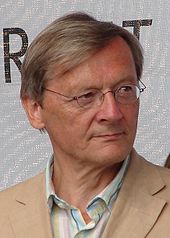
Wolfgang Schüssel, 1995 to 2000 Vice-Chancellor and 2000 to 2007 Federal Chancellor of Austria
.svg.png)
Party logo from the 1980s
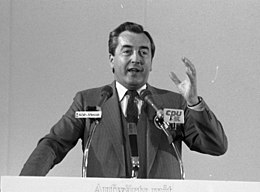
Alois Mock as a guest at the 1983 CDU federal party conference
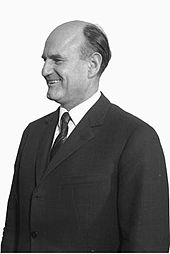
Joseph Klaus
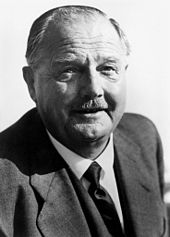
Julius Raab
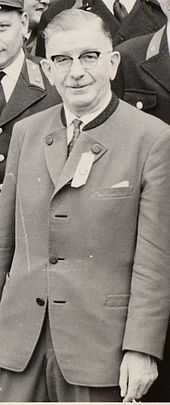
Leopold Figl, co-founder, first Federal Chancellor of the Second Republic, later Foreign Minister of the State Treaty and Governor of Lower Austria
Search within the encyclopedia